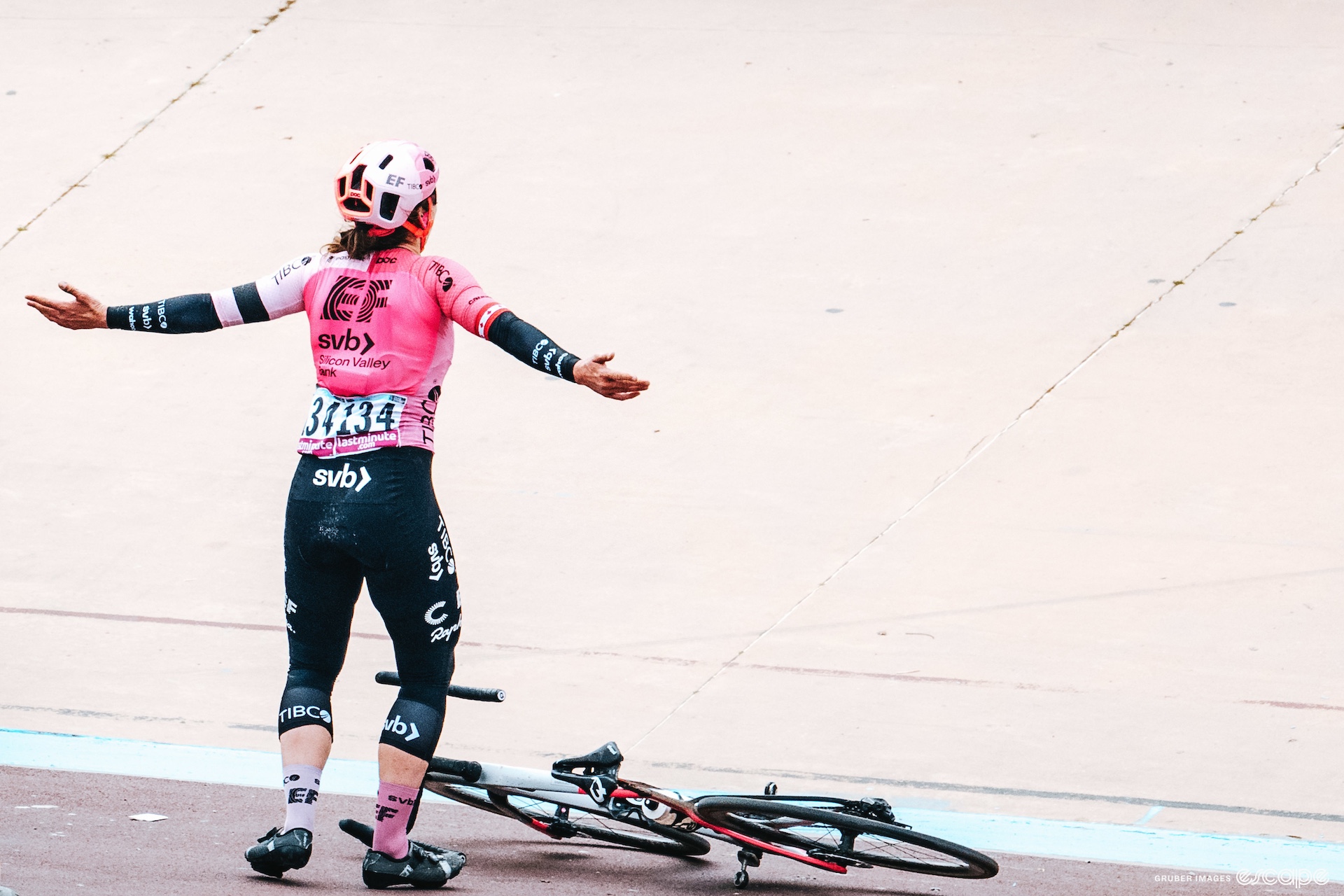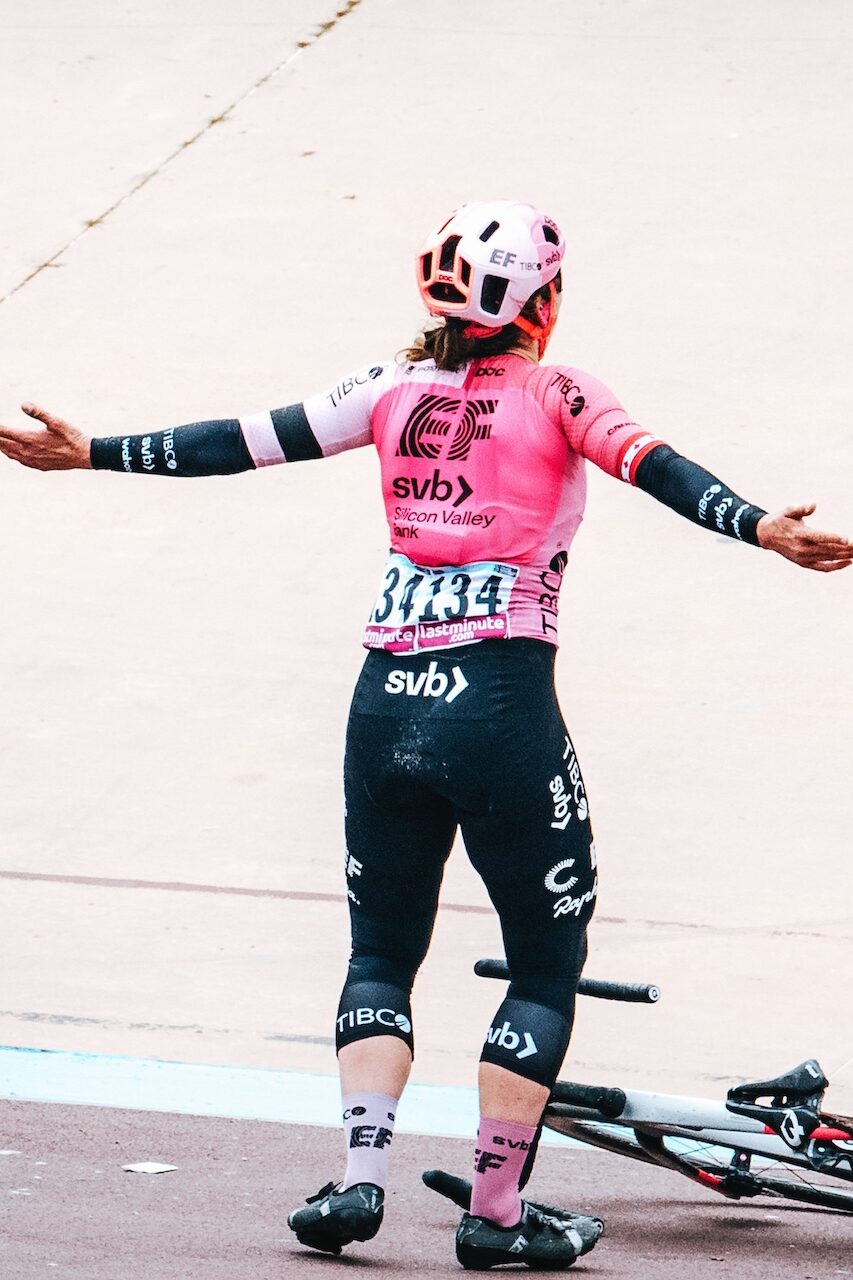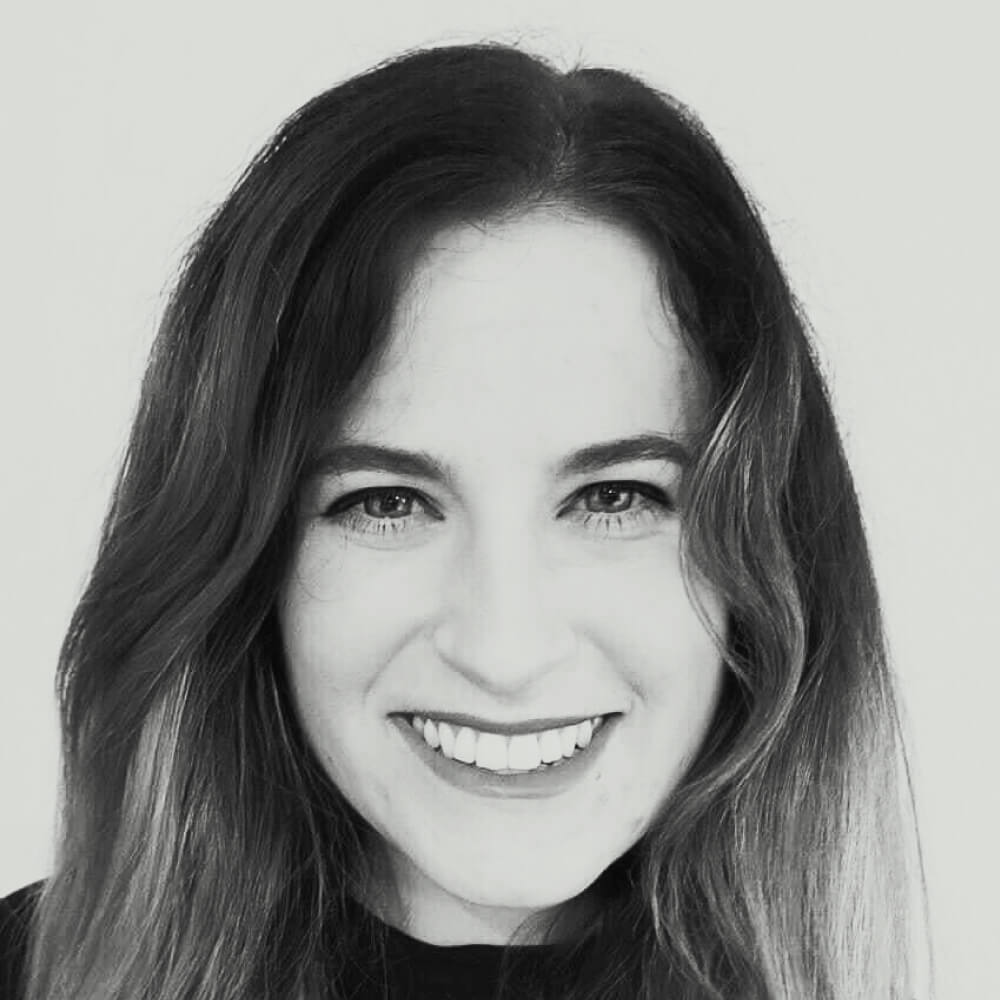by Alison Jackson, as told to Abby Mickey
One year ago, longtime WorldTour professional Alison Jackson claimed her most treasured victory to date when she won Paris-Roubaix Femmes avec Zwift out of the day-long breakaway, a mere 12 seconds ahead of the chasing favourites. Here, in an Escape Collective exclusive, Jackson relives the memories and the buildup to that day.
Every athlete wants to win. You don’t get into the sport expecting to lose as often as you do. I’ve had victories in my career, special wins that meant something to me personally even if they didn’t attract the attention of the cycling world. My first “big” win at the Redlands Classic early in my career; later when I won both the Canadian National Championship road race and time trial; and also a stage of the Simac Ladies Tour … just a few that stand out as significant. But by far the biggest victory for me was Paris-Roubaix Femmes avec Zwift.
The right kind of chaos
Did I manifest my own destiny, in some way? Or was God guiding my life towards this moment? Looking back my result at Paris-Roubaix Femmes was almost written by fate. When planning out the season my coach added Paris-Roubaix to my TrainingPeaks and marked it as an A-race, so all winter and spring there was a constant countdown to the day. It was the only race with a countdown.
Even in my pre-season meetings, Paris-Roubaix was mentioned. My team directors kept talking about it, they kept saying things like, “We really want you fit for Paris-Roubaix.” Going into the season the hints weren’t exactly subtle that the team wanted me to win.
To be so singularly focused is a bit ridiculous as a bike racer because so much can happen. And I love a little bit of chaos in races; I mean, that’s why I love bike racing. But the wet edition of Paris-Roubaix was way too much. I remember finishing and my body was throttled. I crashed three times and I had blisters on my hands, and then someone went, “Are you ready for the next one in six months?” I’m like, “Don’t talk to me.”
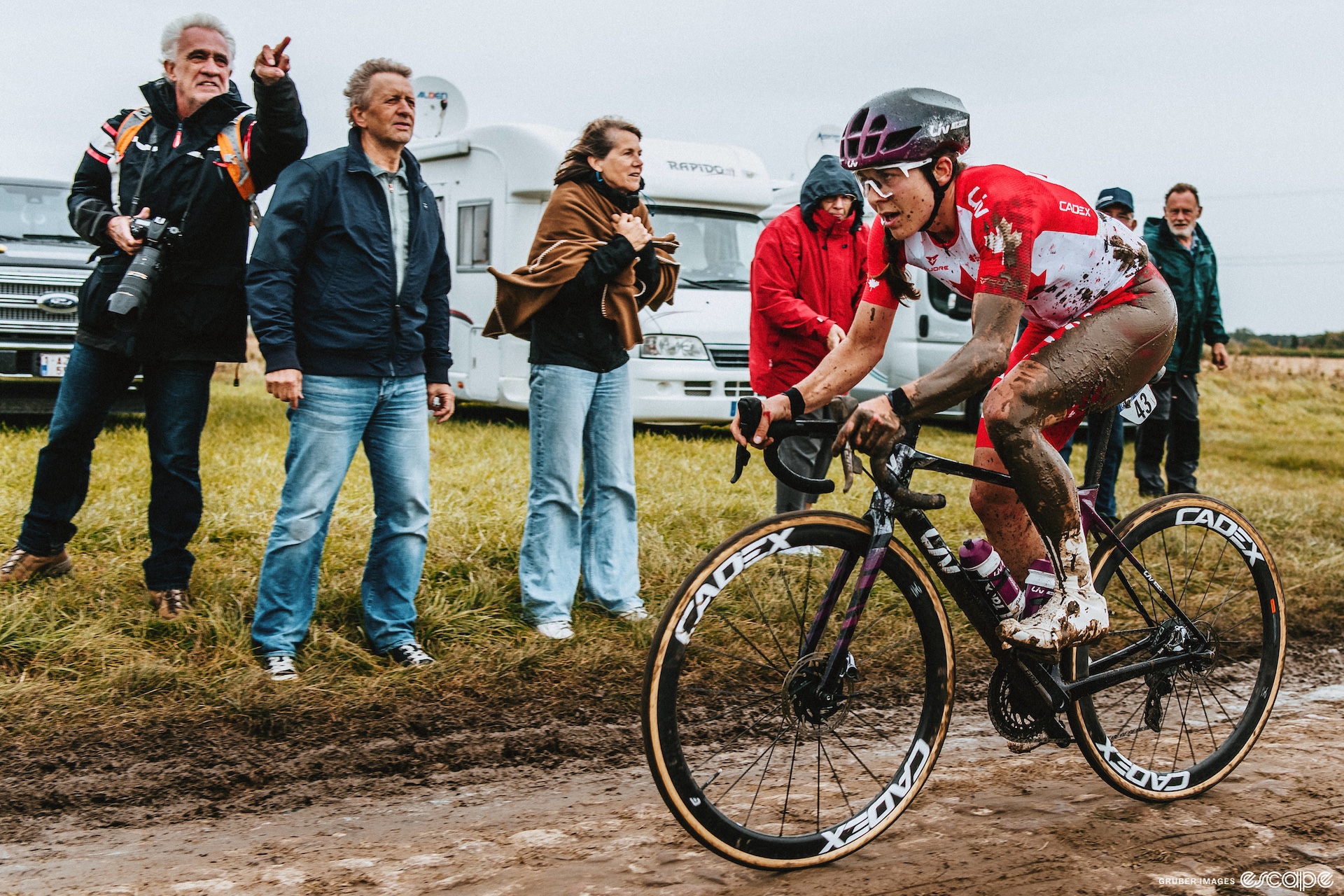
But then my mind is spinning. I finished 24th. And then the next year, in 2022, it was a dry edition and I was 13th, with one crash. And I thought, “Yeah, if I had a clean run at this race, I could be in contention for the win.”
The thing with Paris-Roubaix is there’s so much that’s out of your control. I think that’s where you get the love-hate relationship. It’s so rough. It’s so hard. And if you crash on the cobbles, it’s a really hard type of crash; it’s not like crashing on pavement. And the chance for flats is way higher than any other race. With the wet edition, I was like, “Oh, this is only for the fans.” It’s so entertaining for fans to watch all the action from kilometre zero to the end; there are crashes, the favourites are out, and there are all these anomalies happening. But when it was a dry edition, then it was just the right amount of chaos for me.
Shifting stones
Because I was on a new team, really what I focused on in the spring was how I could teach my team. I’ve tried to win these Classics on my own and you can’t do it. You need a strong team in order to make a good performance. The better I can get my teammates to do their job, the better as a collective we’re going to be in the bike race. So I came into the season and really tackled the role of team captain.
In the early season, in Spain, I really wanted to do some of the pre-season races so that we could practice stuff as a team so that when we got to the Classics, we could be fully confident we could do the job. Every time you go to a new team there’s a learning curve, and I wanted to make all the mistakes in the early season so that when we got to it, we could actually win.
So early on I’d make PowerPoints on sprint train stuff or echelons, just to talk through my experience and break it down for everyone. We had some successful moments. At Strade Bianche, I wasn’t the leader, but I got to be team captain and got to lead by example. We did such a great job, coming into sector five as the first team, leading and showing that we can make a specific plan and make it in these key, hard moments, to be where we need to be, and hoping that translates to when I’m the leader.
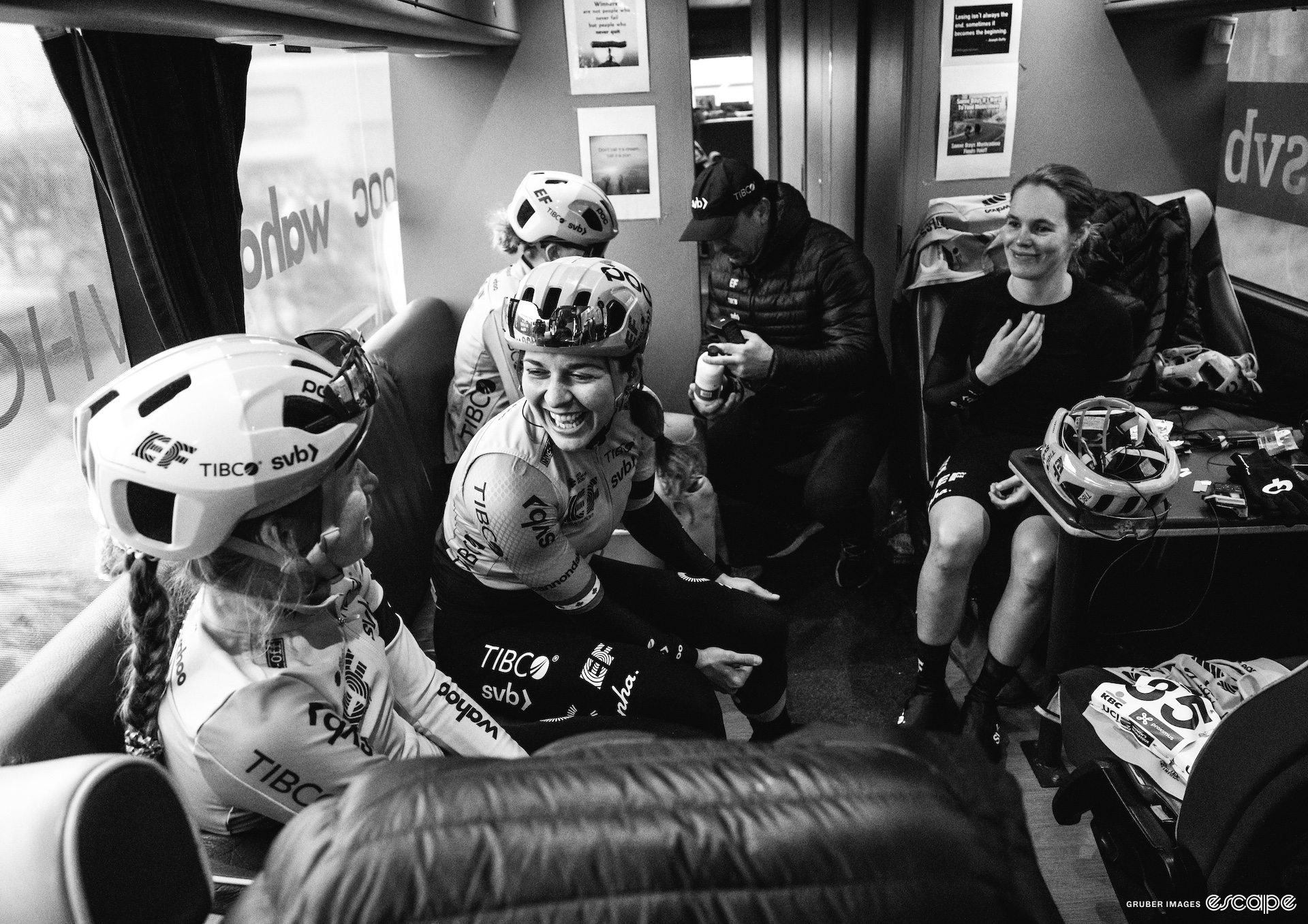
Before Paris-Roubaix, we were staying in a little town just on the French-Belgian border, quite close to Roubaix and Lille. We did a lot of coffee rides to Lille. Our director wanted us to have one big recon day, but that’s too much, too rough on the body. You have to do it in sections. You really have to check out every sector as close as you can to the race so you know what it looks like. I have this spreadsheet where I have notes on every sector, VeloViewer photos, and notes from years previous like, “Could you ride the gutter or not?” You can’t remember everything about every piece of the race so I have this whole spreadsheet to reference.
Recon of Paris-Roubaix needs a little bit more attention than other races, because the road changes so much, just because of the dirt and how the cobbles are year after year, or how the weather is, it really changes the course. In other races like Flanders, you ride the same course over and over. If it rains, you know that it’s the same course; it’s just going to be wet. At Paris-Roubaix, the stones shift. There are potholes. How is the dirt in the gutter? Or is there even a gutter; did it change with the weather?
One day we did a coffee ride and did the last 10 km and the velodrome. Even as a Canadian, not really knowing so much of the history of the race, when you go in there, there’s such a special feeling because none of our races finish on a velodrome. It just feels different than if you were to ride the road into Gent-Wevelgem because that’s just a regular street; everything changes for the race. But for Paris-Roubaix, nothing much changes – the velodrome is how it is, just with no people in the stands. So you could see it and imagine what it would be like to win this race.
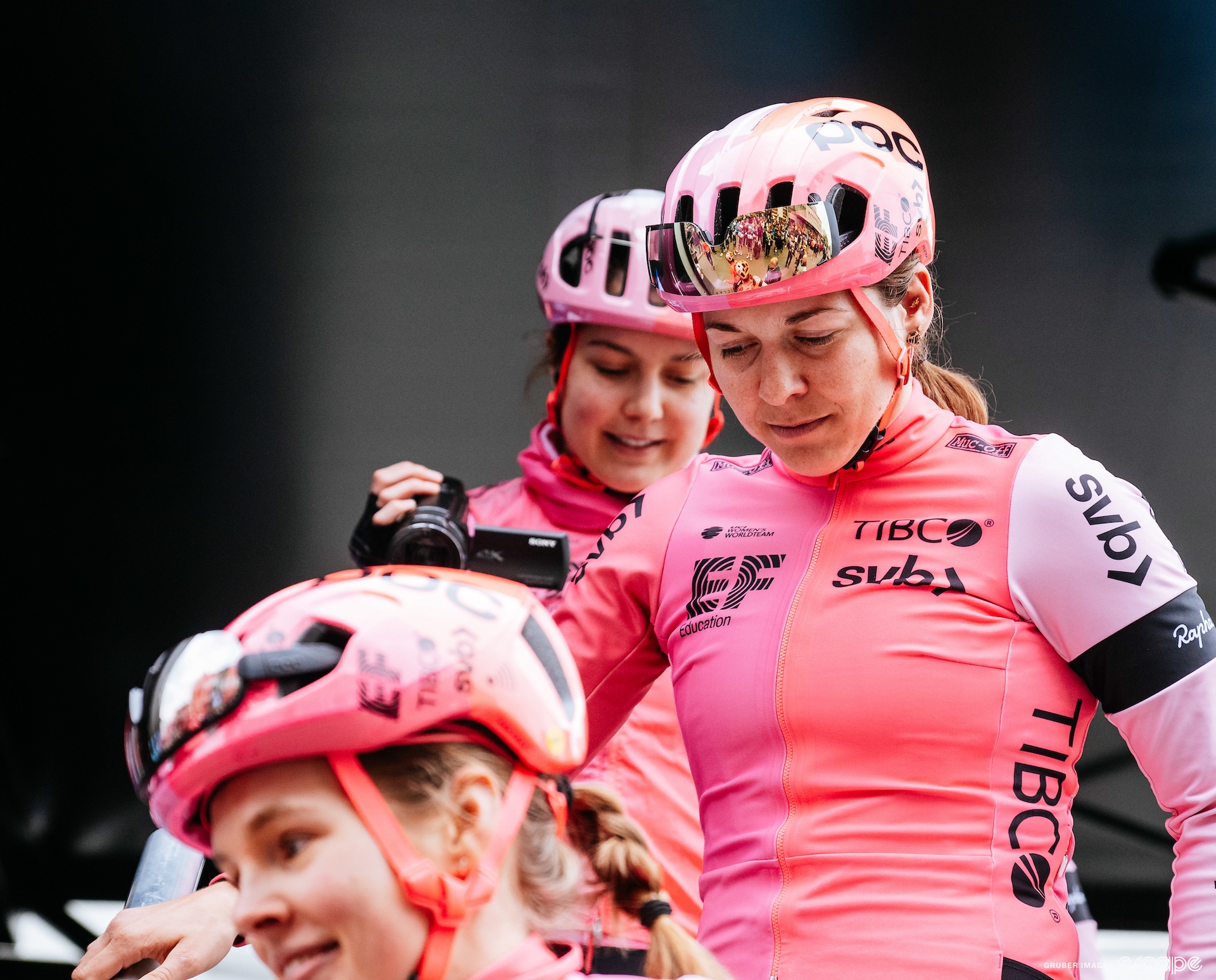
So many of our races as a team we’d been waiting for the big moment and trying to go with it. At Flanders, with how my shape was and when I saw the weather, I was like, “I really want to get ahead. If we can get ahead before the Koppenberg, that’s what I want to try and do.” I tried the segments in between. But the counterattack that got away with Elise Chabbey, they beat all the chaos that happened on the Koppenberg, and so many of us lost the race on the Koppenberg by not being able to cyclocross that climb. Already I’d been thinking, “We have to do something different than wait.” I was so frustrated to have missed that moment in Flanders because that was the moment we had to go.
Some of that was just really fueling the fire in me. To just wait, and if you miss it and ride in to finish in the bunch, that’s not a great feeling. I would rather be in a race where I ride full out, maybe even a little stupidly, but giving my full effort so that at the end of the race I think, “I gave everything I could.” I was carrying that with me after Flanders.
The thing about this race, even if you have a lot of strong goals, in the end at Paris-Roubaix there is so much out of your control. All week before the race I was living my best life. I was enjoying being with my teammates and the media team; we are surrounded by really good people. Everyone was excited about the race, to be a part of the race.
For me, it was really easy to let it go and be chill the night before the race. I was rooming with Zoe [Bäckstedt], who is passionate about this race, but she doesn’t take it too seriously yet. She likes to have a lot of fun. We were making jokes and having fun; it keeps it light and you can laugh and chat about things that aren’t the race. Give your mind a bit of a break. When we got on the bus Zoe and I immediately had the dance party going. It was loud, and the bus was shaking, riding to the start we were just enjoying being where we were.
My perspective before the race was that there was way more pressure on Zoe than me. Her whole family was there, her dad [Magnus Bäckstedt] who won it back in his day. I was more interested in keeping morale up for Zoe because you want her to have a long career and not feel bogged down by the pressure. But in a way, that energy on her took any pressure off of me.
When the plan comes together
We’d talked almost all week about how (Roubaix) might play out, so the night before it was a pretty quick meeting. We all came with a similar agenda, an idea of the race. I expressed that getting ahead of the race, in this race, is going to take you far. Once we get to the cobbles, at any moment you’re at the front, make an attack.
Often you go into a bike race with a goal, and a clear plan, but rarely does that plan come to fruition. The plan for me at Paris-Roubaix Femmes was always to get ahead of the race, but there are at least a hundred other riders who also have this goal. The odds are never in your favour, so you need to force luck to your side.
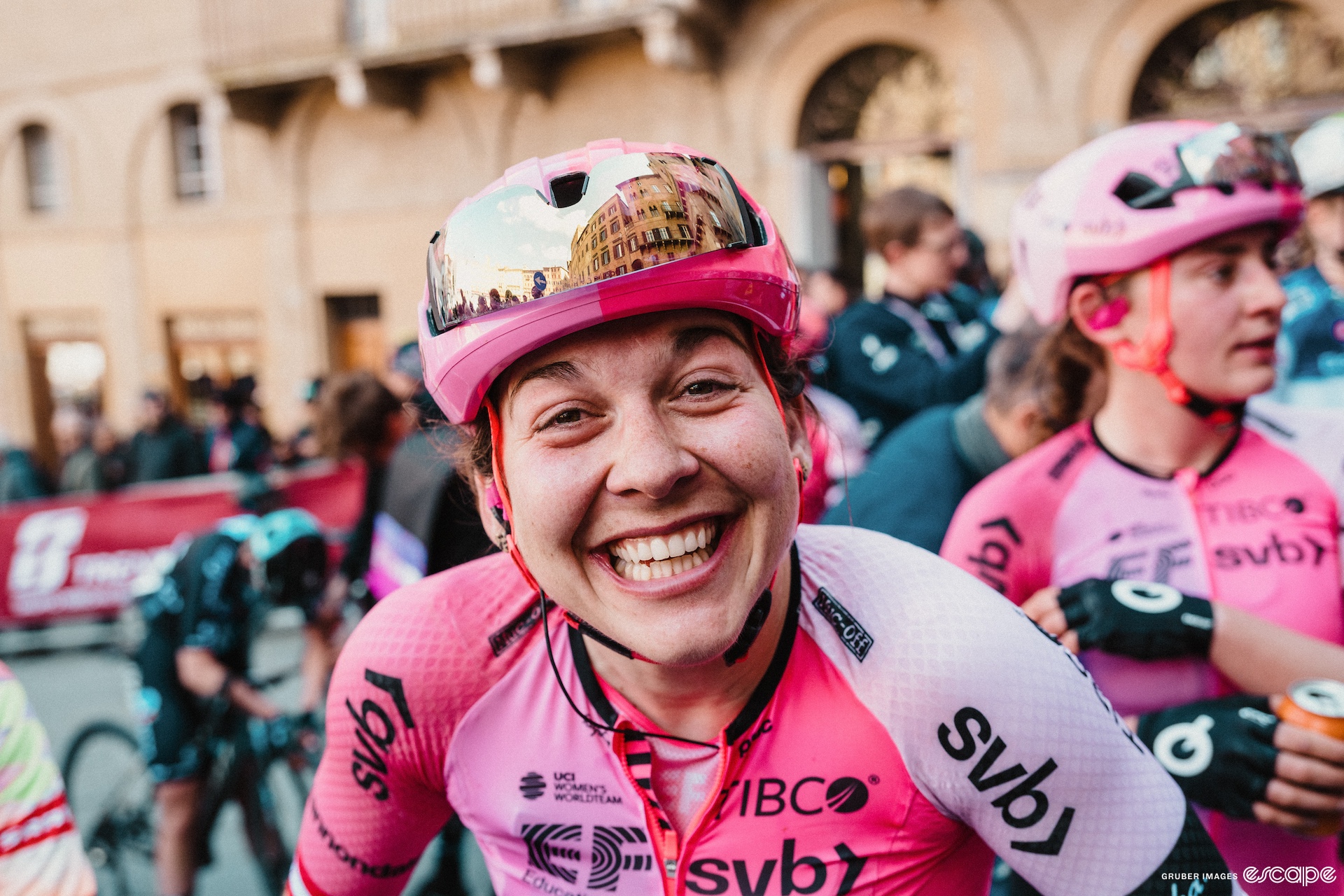
It’s often said that you can’t get lucky in bike racing. You can be unlucky, but you can’t win a race because of luck. You earn it; you fight for it. You make sure you’re in the right place at the right time. For me, on April 8th, I was in the right place at the right time but it wasn’t because of luck. It was always the plan to be there, but even if the plan goes well it’s not always guaranteed that it will work. The plan worked in the Roubaix Velodrome, the home of many dreams and so much heartbreak.
It wasn’t a day like any other. On Paris-Roubaix morning, the air feels different. There’s an electricity in the air, I think it’s just the anticipation. I am an entertainer. I live off that energy. The atmosphere around Paris-Roubaix, I feel that and feed that back into the world around me. Even now, when I go into the velodrome I still remember that feeling of being there, in the first edition, seeing Lizzie Deignan win. I have a poster of her and her quote at the end of the race: “This win is for all the women before us, who didn’t get the opportunity to ride this. And for all the girls coming up ahead.”
I rarely tell my family to tune into my races; it’s been years at this point and most of them have lost their novelty. But on the morning of Paris-Roubaix Femmes, I did message them to let them know I was racing, and it might be a good one to watch. Of all the races on the calendar, this one is guaranteed action. Guaranteed chaos. It doesn’t matter who wins and how, there will be countless stories that come out of it at the end of the day. I knew my dad would love to watch this type of race, partly for the bike racing, but also for the farms on the side of the roads.
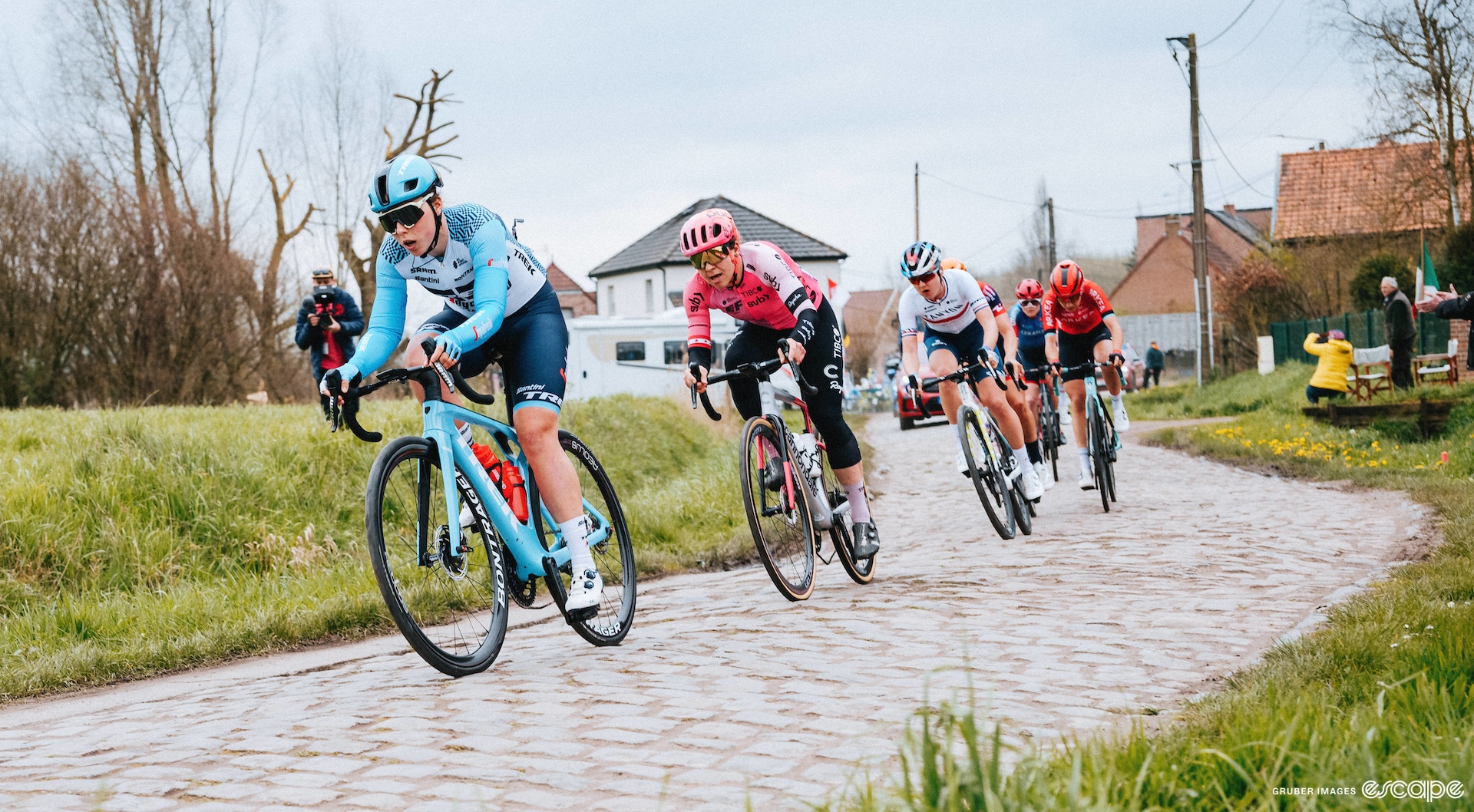
The mantra of the day was “Don’t Think, Just Do,” inspired by the new Top Gun movie. When I rolled up to the line I was at the back of the peloton because getting to wiggle up to the front once the race starts is a good motivator. From the moment the race started it was chaotic. My teammate Sara Poidevin was covering moves, but none of our other teammates were there. I wanted to ride in the front anyway, to see how the race was playing out. I wanted to be ready to jump into a move if it looked like a good one.
As we were exiting the city I jumped across to a group that had just rolled away, and we were rolling through, working together, and I looked back and the bunch was gone. Straight away everyone was rolling through. There was one SD Worx and one Trek-Segafredo, but the rest of us were committed to establishing the break.
When riders start sitting on, it makes people second-guess themselves. But a few of us were chatting. Susanne Anderson and I used to be teammates so we talked, and the decision was to commit even if a couple of riders were employing negative sit-on tactics.
The group was so big that after you take a turn you get plenty of recovery time, so for the most part, everyone was taking a turn. But at one point there were five riders sitting on and one of the girls came to me and said, “Alison! All these girls are sitting on for a free ride!” I just said, “Well, there are still 15 of us riding, those are pretty good odds. Instead of stressing about what they are doing, what are you going to do?”
Before we got to one of the cobbled sectors about half the group was sitting on, but with the rest of us working, there were enough of us still working. I had enough confidence in me, it didn’t matter if they were sitting on, I was looking at our time gap from the peloton and thinking about how we had two options; we could either stay away, or we could get smaller and the strongest of the peloton would join us down the road. Both options included me going to the final in this group.
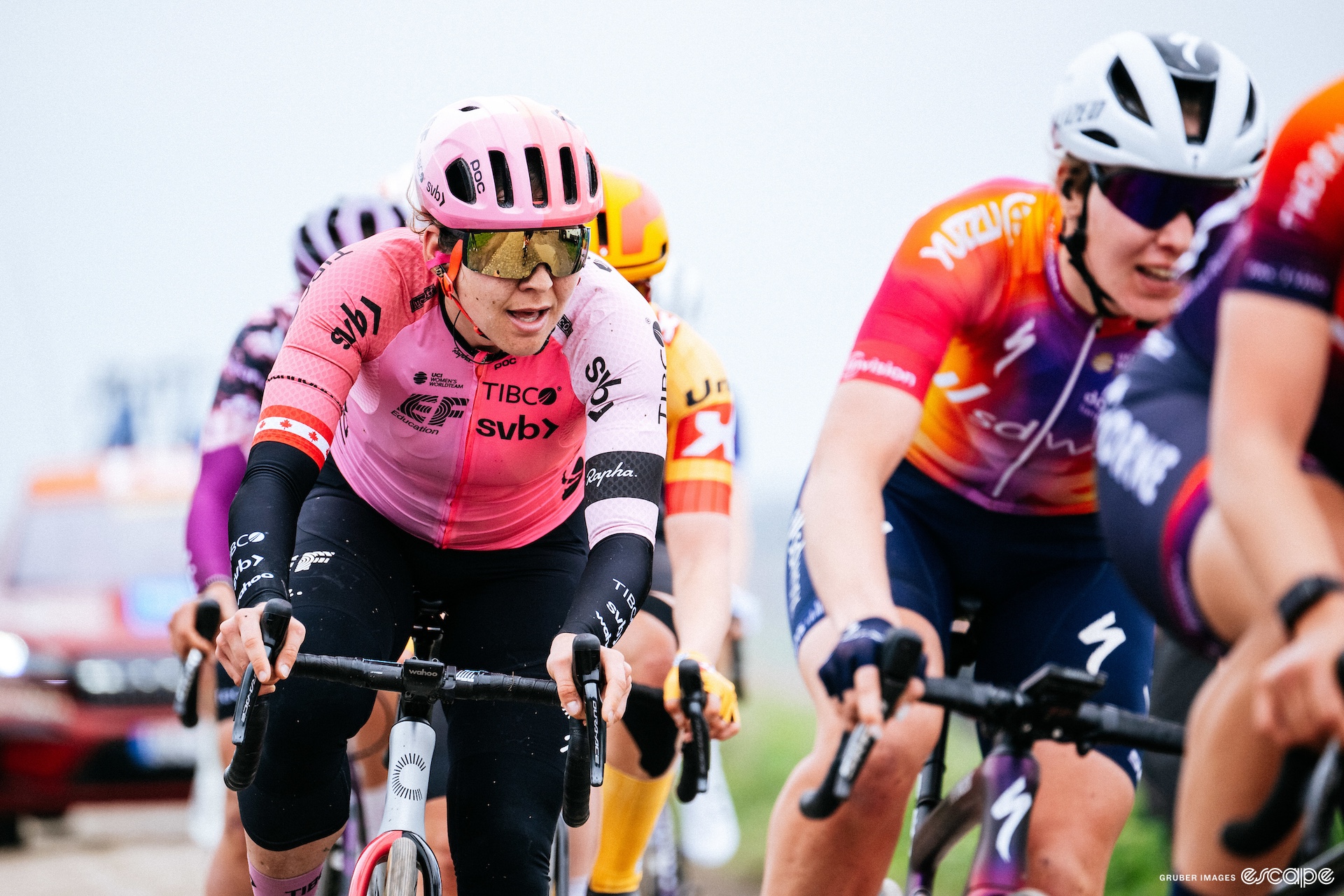
All in
I wanted to come to the final with a small group, whether it was the group we had or it was a combination of some from our breakaway and some who came across to us. Plus, at that point in the race we were in a group with five minutes on the peloton; it was the tactic I was employing and I wasn’t about to second-guess playing the breakaway card. That was the game we were playing.
On the cobbled sectors, all the riders who were sitting on would surge to the front, to be first into the cobbles. A lot of times the Trek-Segafredo rider would be the first person into those sectors but immediately she would slow down. Right away I recognized what she was doing and I told everyone not to let her be on the front on the cobbles. I started to take over the pace going into the cobbled sectors because it’s one thing to know your own tactic but you also need to recognize what the other teams are trying to do. It will change your decision-making throughout the race.
Even my DS on the radio was telling me, “Alison, you’re doing too much work!” But I knew how I felt. I knew the race was going to be hard anyway, sometimes you have to give to get anything back.
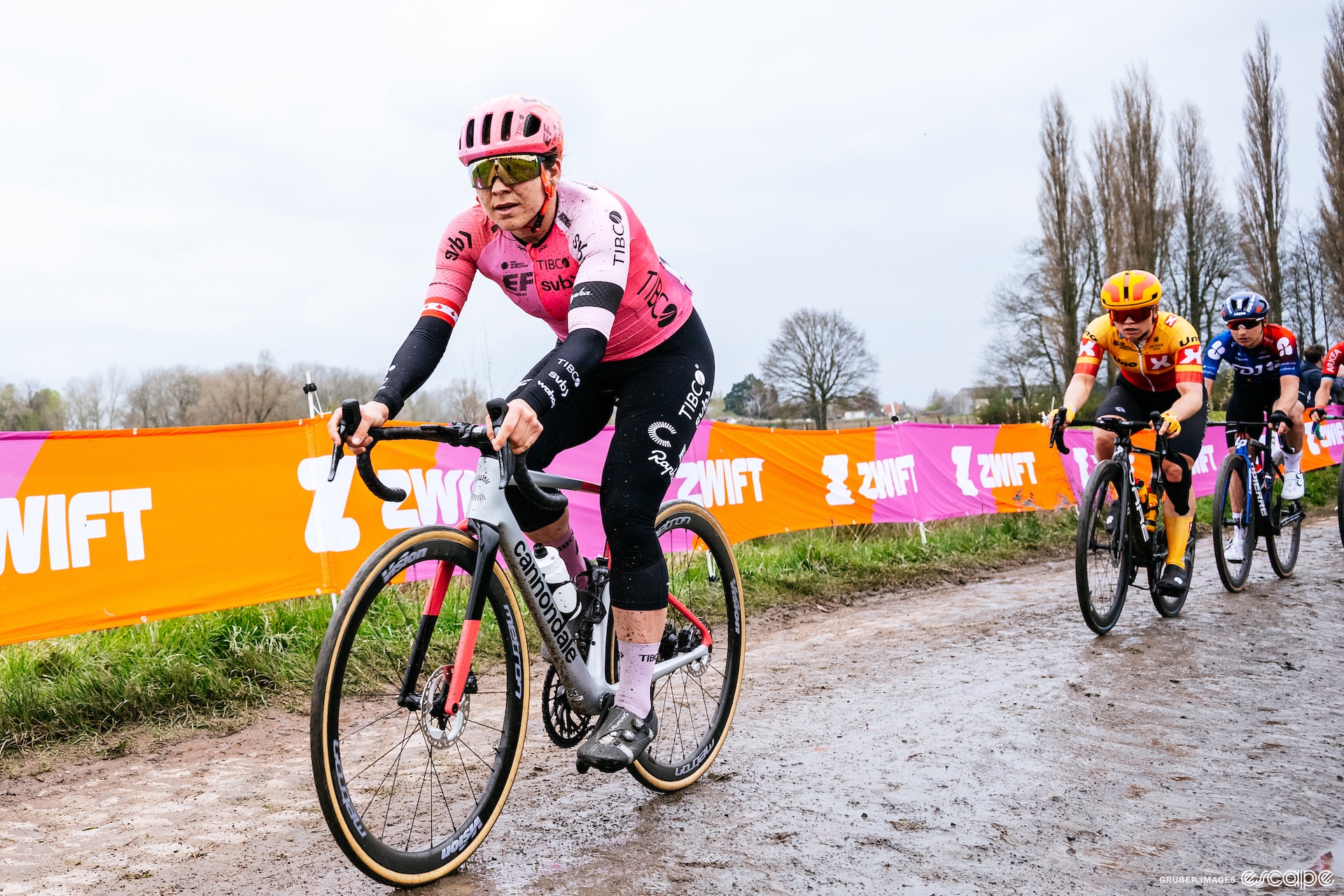
In my mind I knew that a solo win was the best way to win, it’s the only sure way to do it. There were a lot of girls in the break that I wasn’t sure what their skillsets were. There were some I knew, like Susanne; I knew she was a really strong sprinter. Femke Markus, from SD Worx, was in the best position; all her leaders were behind us, so she’s just sitting on the whole time. She’ll be the freshest of all of us, so how do you burn her up?
The further we got, the more cobbled sectors we crossed, there were fewer people there in our group. That’s when I started trying to attack. No matter which group you’re in in Paris-Roubaix, every time you go through a cobbled sector it becomes a race of attrition. People aren’t going to get on the wheel as quickly on the cobbles, maybe they don’t take the right and left turns on the cobbles at the same speed or confidence. When I would ride the gutter I had way more speed, and I knew when to pick up the speed and not lose momentum. There are always going to be people who make gaps.
When we got a little closer to the finale, I didn’t know how big the group was behind, and at that point, I started playing a game of attacking and sitting in, which slowed down the group a bit. But when we got to 5 km to go and I looked back and saw a huge group I got the feeling that we had been out there for 140 km already, and there was no way I was going to give it up like that.
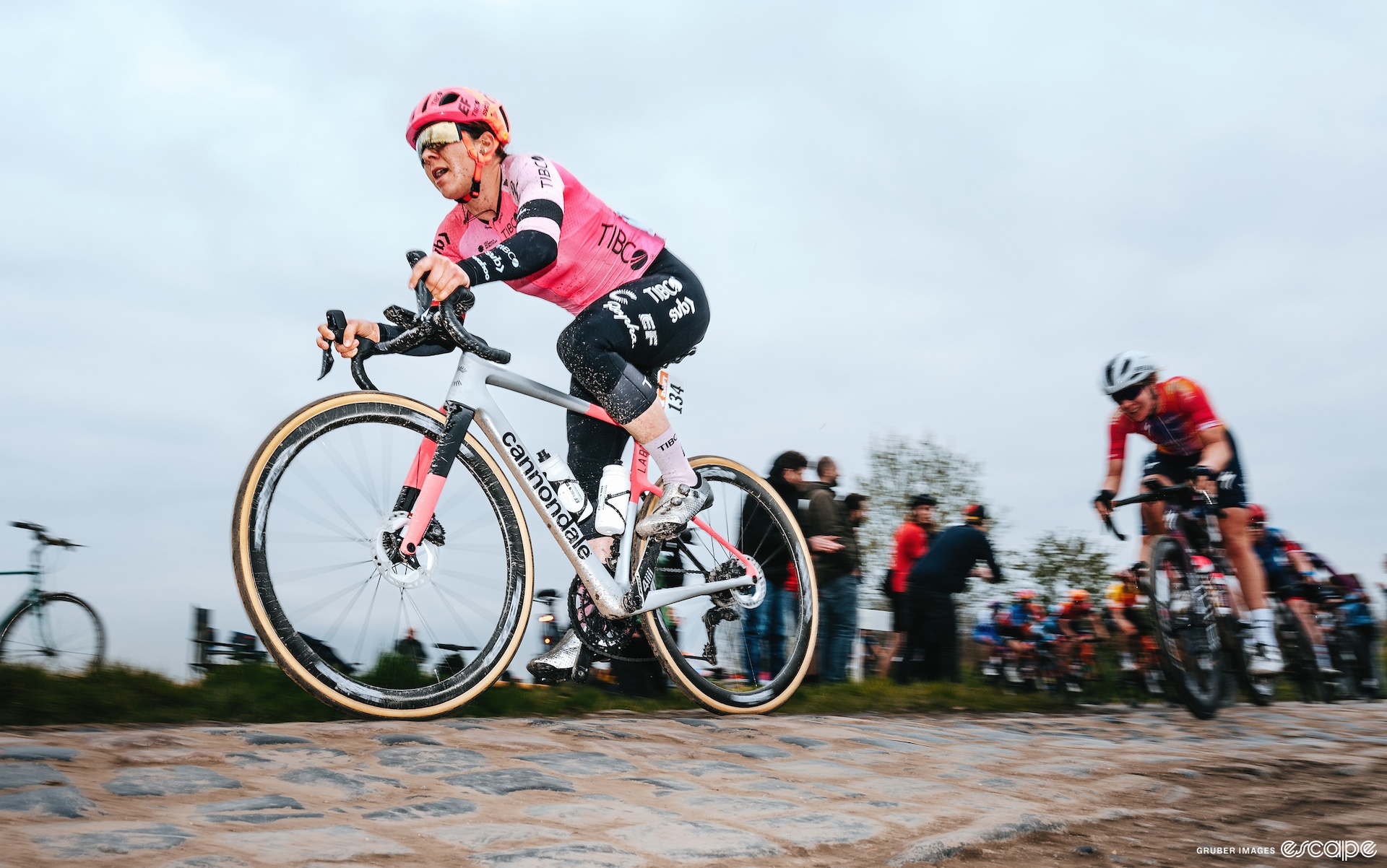
I back myself as a good sprinter. But when you have a big group like that, any time you go into a sprint it’s about timing and position. You could do everything right all day and lose it in a sprint because it’s so hard to navigate every time. I looked back and thought that I didn’t want to take my chances in a sprint of more than 20 people.
Our DS was only giving me the time gaps through the radio, so I was making all my own decisions in the group until 3 km to go. At that point, you have a little hill, and he told me that if I could make it over that slight hill with a gap I could make it to the final. Marta [Lach] took a really hard pace on the climb and I pushed it over the top, so we could keep our gap.
So that’s when I said to the girls that this was our last moment, the deciding factor. I had an ally in Marta and even with only four of us continuing to work, I didn’t care. I knew the worst result I would have from that group was seventh, and that is still a great result in a WorldTour race. No matter the end, you have that result forever.
After that, I didn’t look back again.
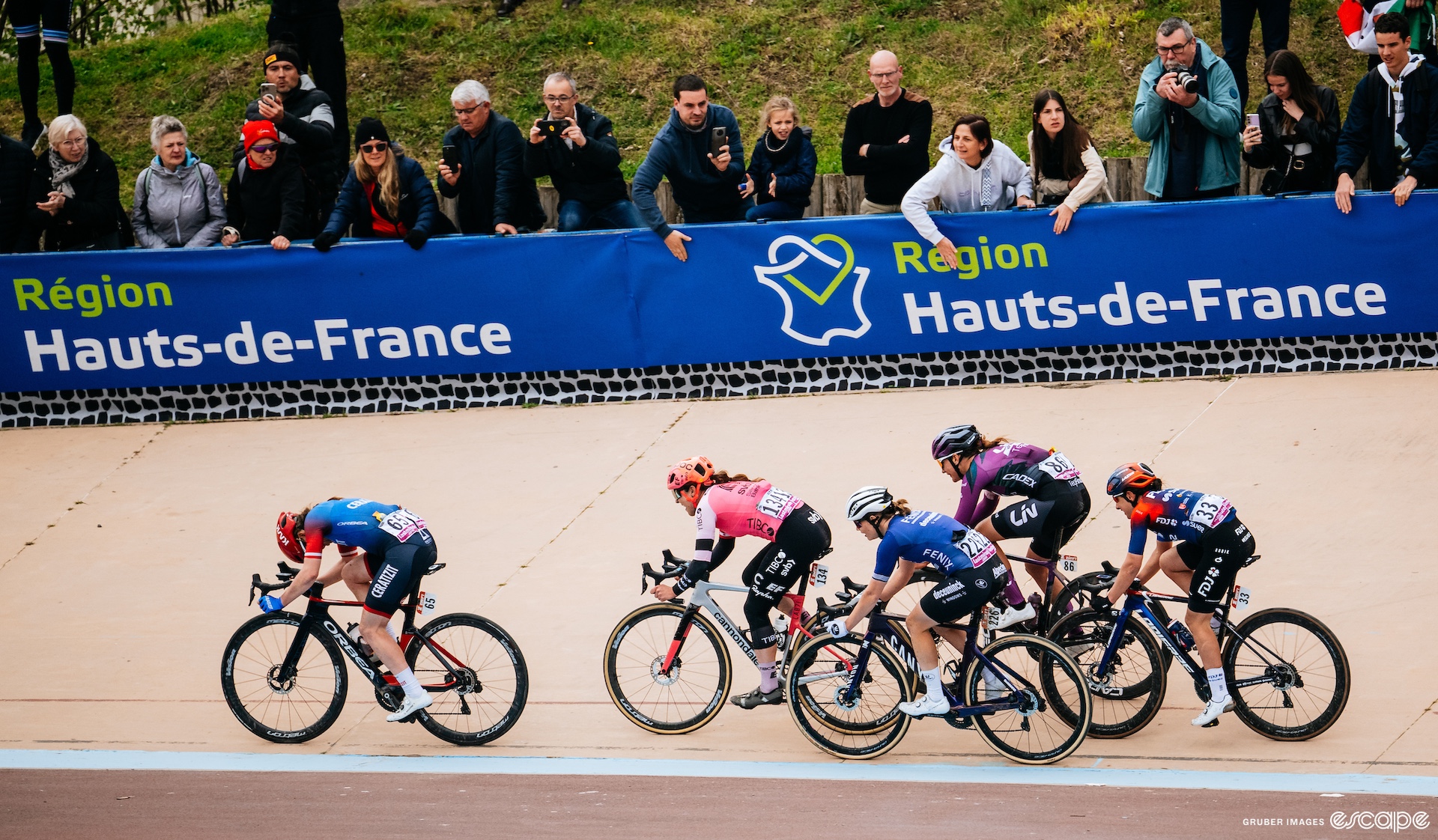
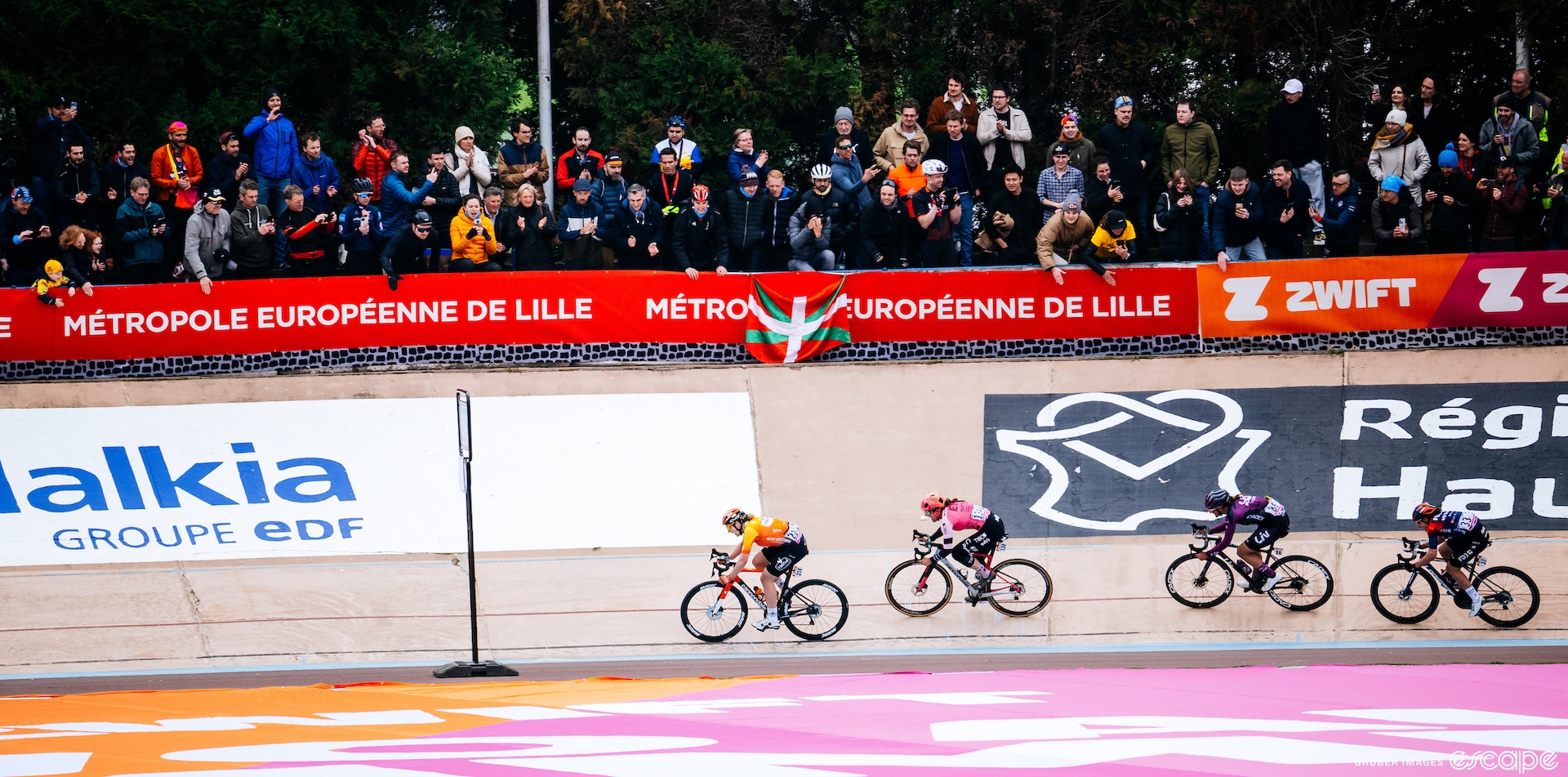
When we got to the velodrome Marta took it over with me second wheel, and I knew that was the best place to be. Marta went full gas into the velodrome, which was perfect. The speed kept the group strung out.
Coming into the second corner, Marta didn’t want to ride on the track but we had too much speed to be on the apron. She slipped a bit but stayed on the track. I knew it was a road race, but when someone came on my left side, it was frustrating. As soon as I thought that she crashed, and then the momentum came out a bit. I didn’t want to get boxed in, so I started to accelerate with 300 metres to go and that’s when the other girl started to come around me.
That was when I dug the deepest. At that moment I thought, “Fuck, did I lose it?”
Even without much track experience, I knew if I stayed a little higher I would come out of the bend with a little more speed, and I hoped that was enough.
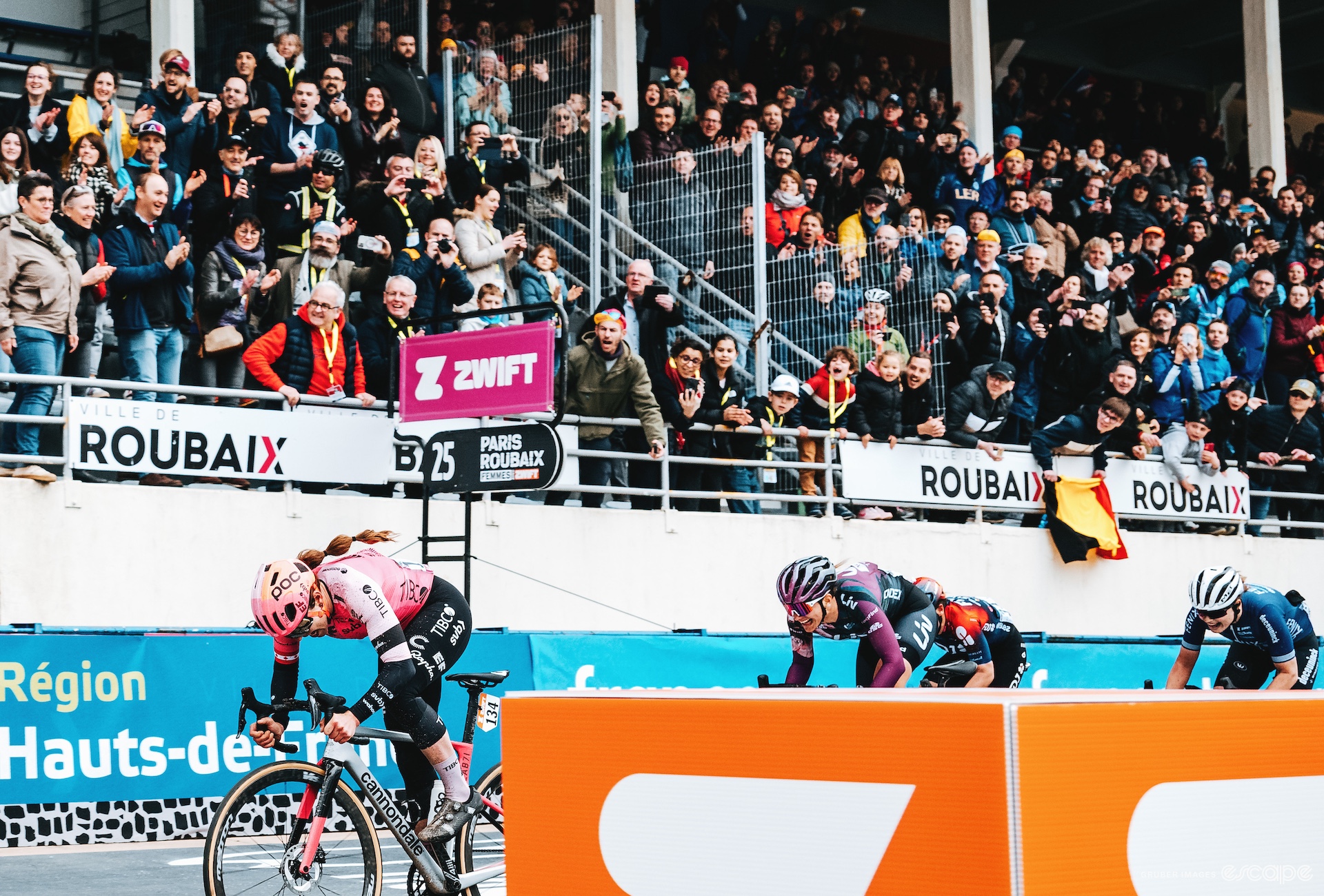
As soon as I started passing I knew I had way more speed than anyone else. All I was thinking about was giving it everything. I wasn’t looking around; I was all in. Even as I was getting closer, you never want to think you have it and have someone out-throw you at the line.
I didn’t want to believe I had it until I crossed the line.
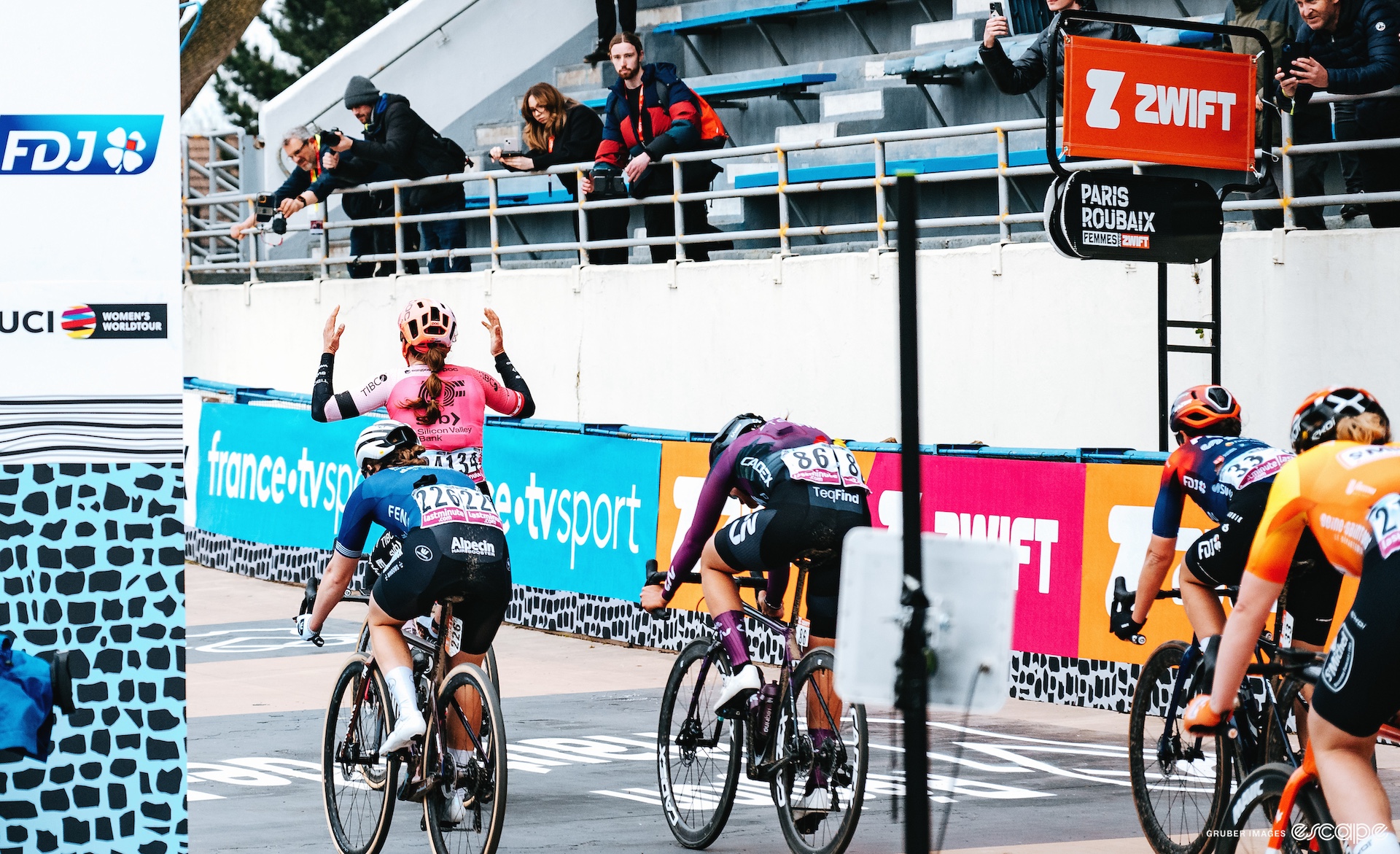
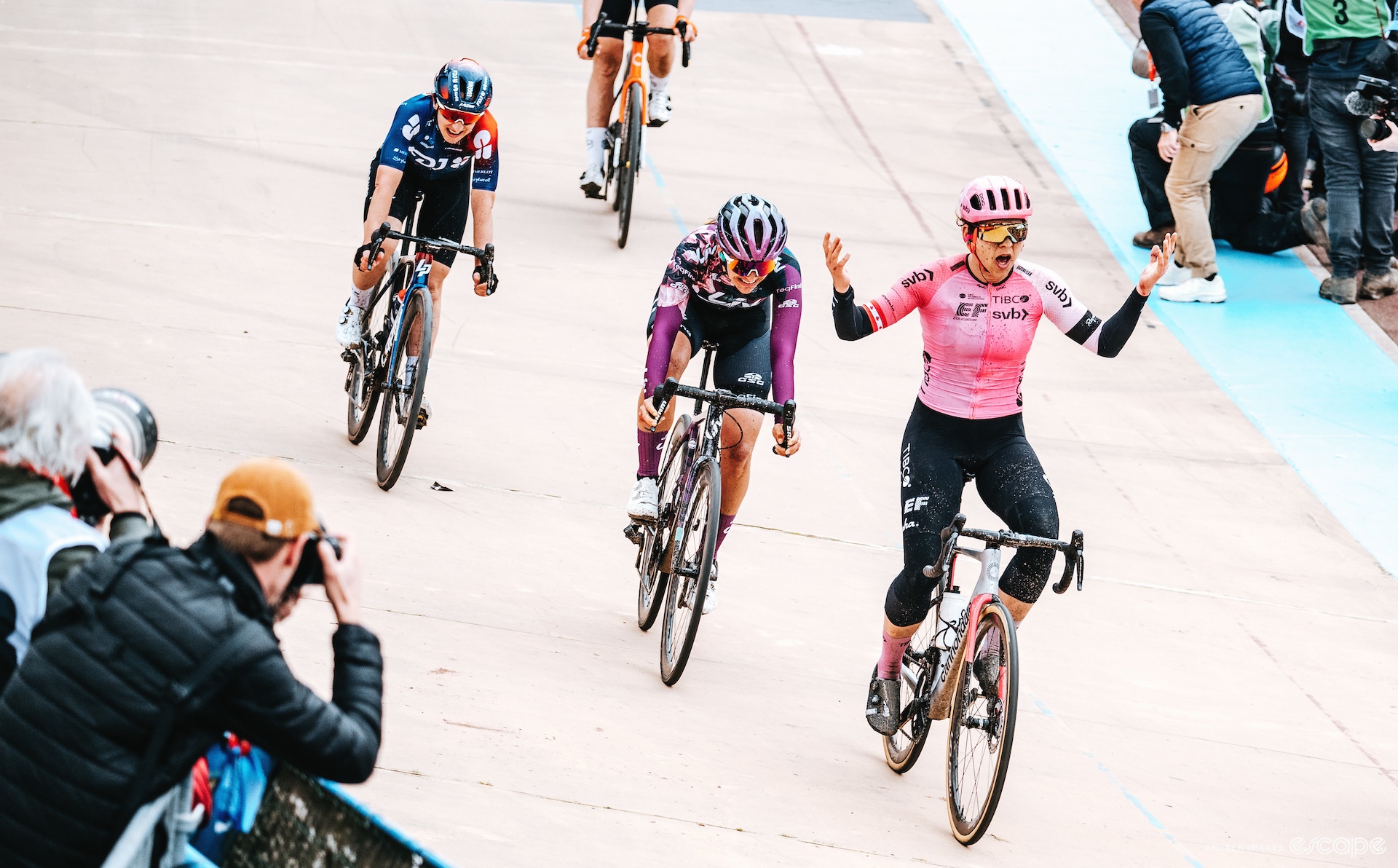
When I crossed the line my reaction wasn’t surprise, it was more a realization that the dream was real and that it was mine. No one did the race better than me on that day.
The first thing I thought about was who could I celebrate with, and the first person I saw was Bastien Gason, the photographer. We’d become friends at the races because of shared interests so standing in that media group is someone I know, who knows me, and who is part of my story. He was the first person I saw, and it was amazing to be able to share that moment with him and to get that hug. I had no words for what we just accomplished for Linda [Jackson, team owner], for the team, and for me personally being on a team that could win a race like this.
I had no words, I only had dance moves.
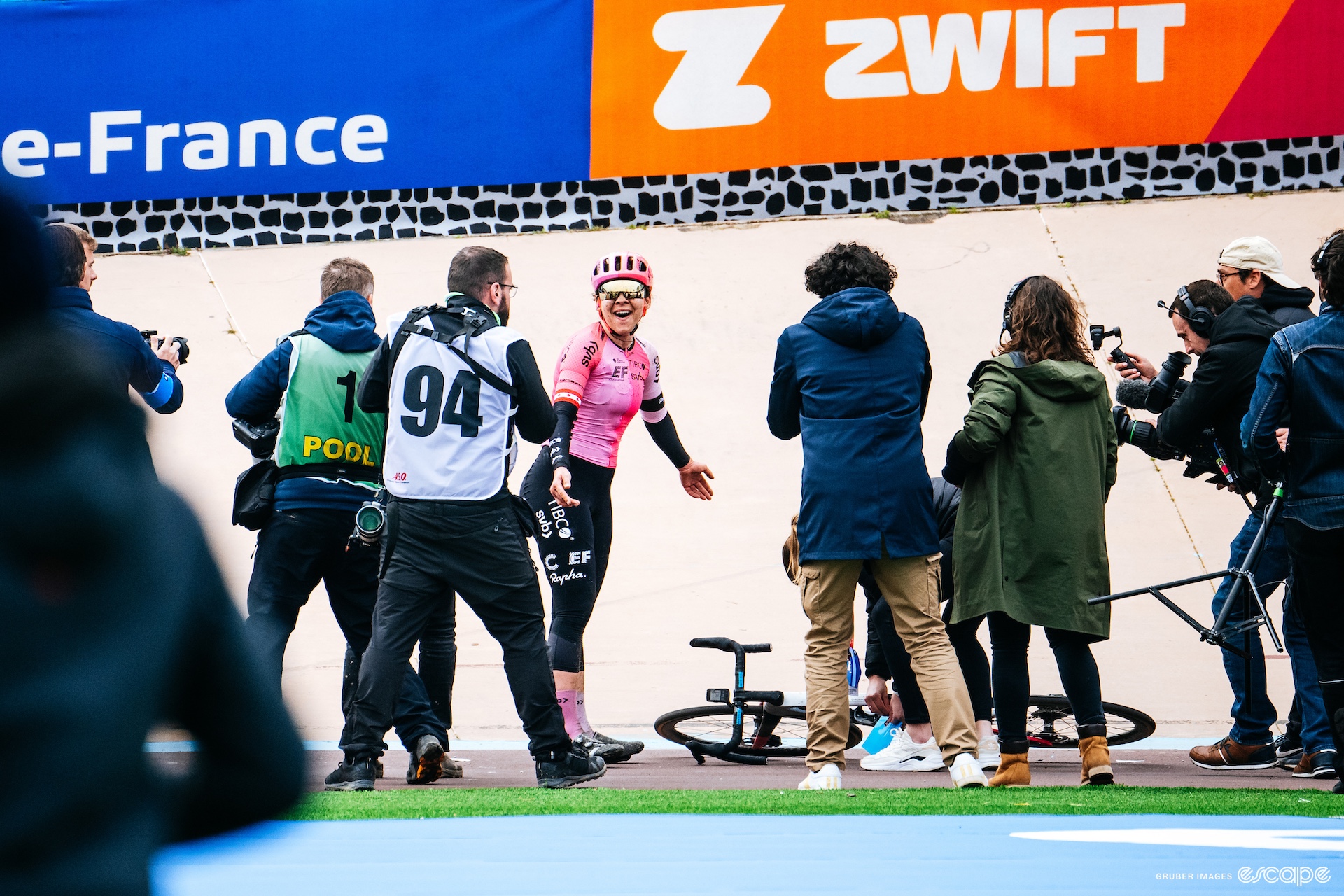
My soigneur Meg who has become a great friend, Kathryn Esra and our media team, those are the people you want to share it with. The people who are part of the program, who are part of cycling because they believe something like this can happen. They know what it takes to get there.
A different kind of chaos
From finishing the race to getting to the showers was two hours, two hours with cameras and media everywhere. Even people I didn’t know were so excited. When I got to the hot seat for the post-race interview they had to wait for the TV to be ready and I told them, “I’ll sit here all day! This is my favourite seat ever.”
I see the heroes of our sport. They finish a race and they do the interviews, but that day it got to be me. How many times in my career will that happen? I don’t win a ton of bike races, but when I do I am going to take advantage of it. I thought, “I am only going to be here once,” so in those moments I tried to make time slow down so I could soak in every moment.
I’ve been part of this sport for eight years, and to do something like that took eight years. Even if the time after the race when the win was so fresh only lasted for two hours, even if it was such a small fraction of time in my career, I was going to make it last as long as possible. For me, to remind me of all the hard work it took to get to that point. You try to remember all the details, like your teammates trying to come find you because they are sharing in the success of that moment too, it meant as much to them as it did to me.
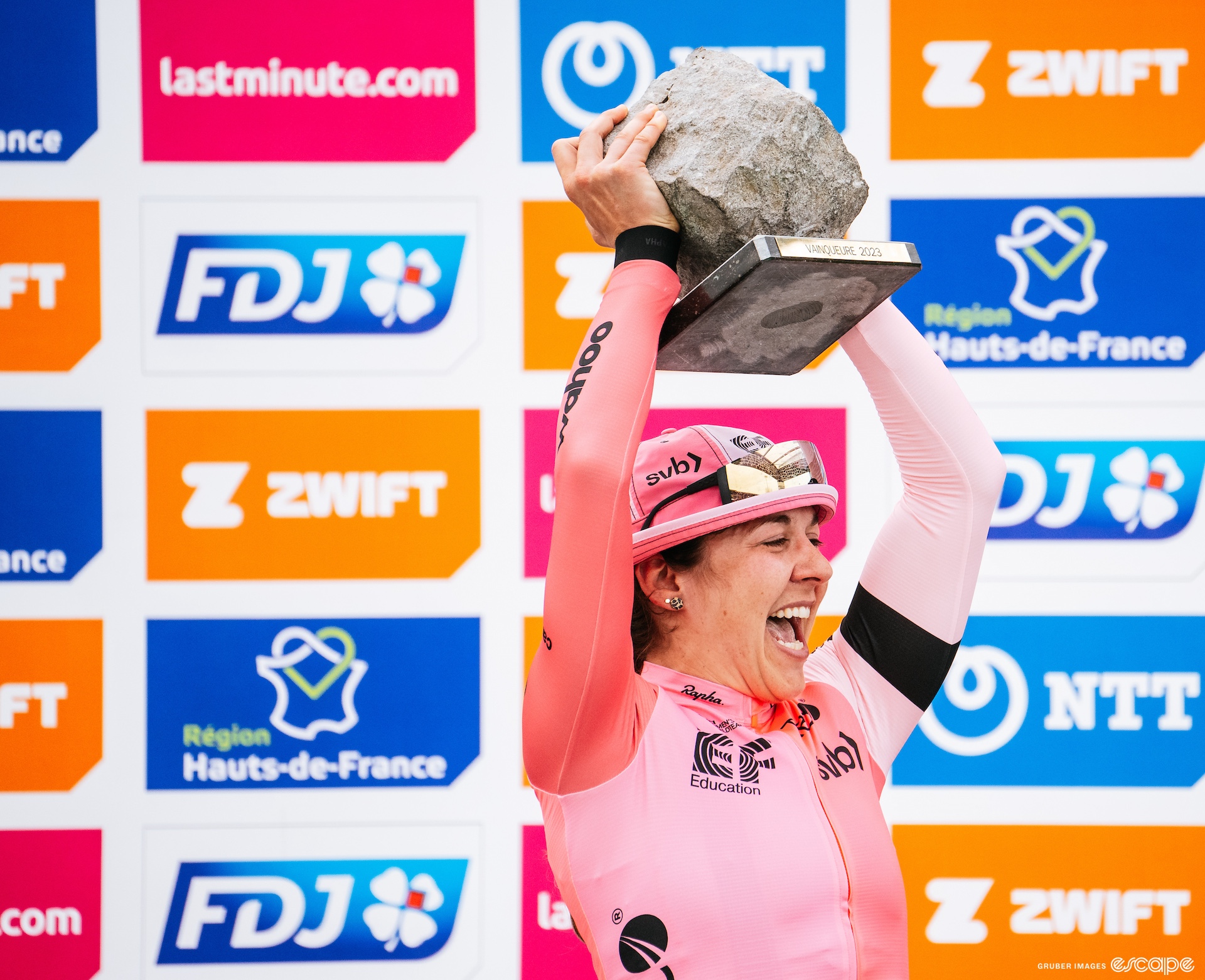
When it was done I had a moment when I was thinking about my family, how I had texted them in the morning. I thought, “I hope they watched this race; I’m glad I sent that reminder that this race was on. Do they realize they were a part of this journey with me?”
On the podium they don’t hand you the rock; it comes out of the floor like some kind of rock show. And it’s not light; it’s 15 kg! One of the best moments was standing on that podium, rock in hand, looking around for someone who could sing the Canadian national anthem with me. I was looking around thinking, “Wow, no one knows my anthem,” and at that moment Sara Poidevin had just ridden into the velodrome. She was out on the track and we made eye contact and started singing the national anthem together. That was one of the most special moments for me, being able to share that moment with someone so special to me and to the team.
There aren’t many Canadians in the women’s WorldTour. At one point Simone Boilard, who rode for St Michel-Mavic-Auber 93, came up to me. We’re similar riders, and we’re both super competitive which is really fun. I could see in her face that when she saw me winning this, she could see herself winning this. We’ve never had that as Canadians; we’ve only seen other people, other nationalities winning these races. But for her, she knows we are similar types of riders with a lot of grit, and she knows me on a personal level. As a Canadian, we joke that Canadians at best can finish third at the Olympics, but this win was beyond me. It shows other athletes from Canada that it’s possible.
Even people who aren’t athletes were coming up to me saying that after they saw me win they felt they could achieve anything, because of the way I won, how I rode with my heart and I worked hard. That’s what is so cool about sports, and athletes. Moments like that are why athletes are inspirational.
I hear through friends that people knew I’d win this race because of a TikTok I did years ago. I always thought I could win this race, but I’m confident. I know I can win any Spring Classic if everything comes together. But we waited forever for a women’s Paris-Roubaix, I got involved because it was this fun “new” event that meant something for women’s cycling. Making the videos, it was because everyone was talking about Paris-Roubaix; people were telling me it was a good race for me so I started thinking, “Well … maybe.”
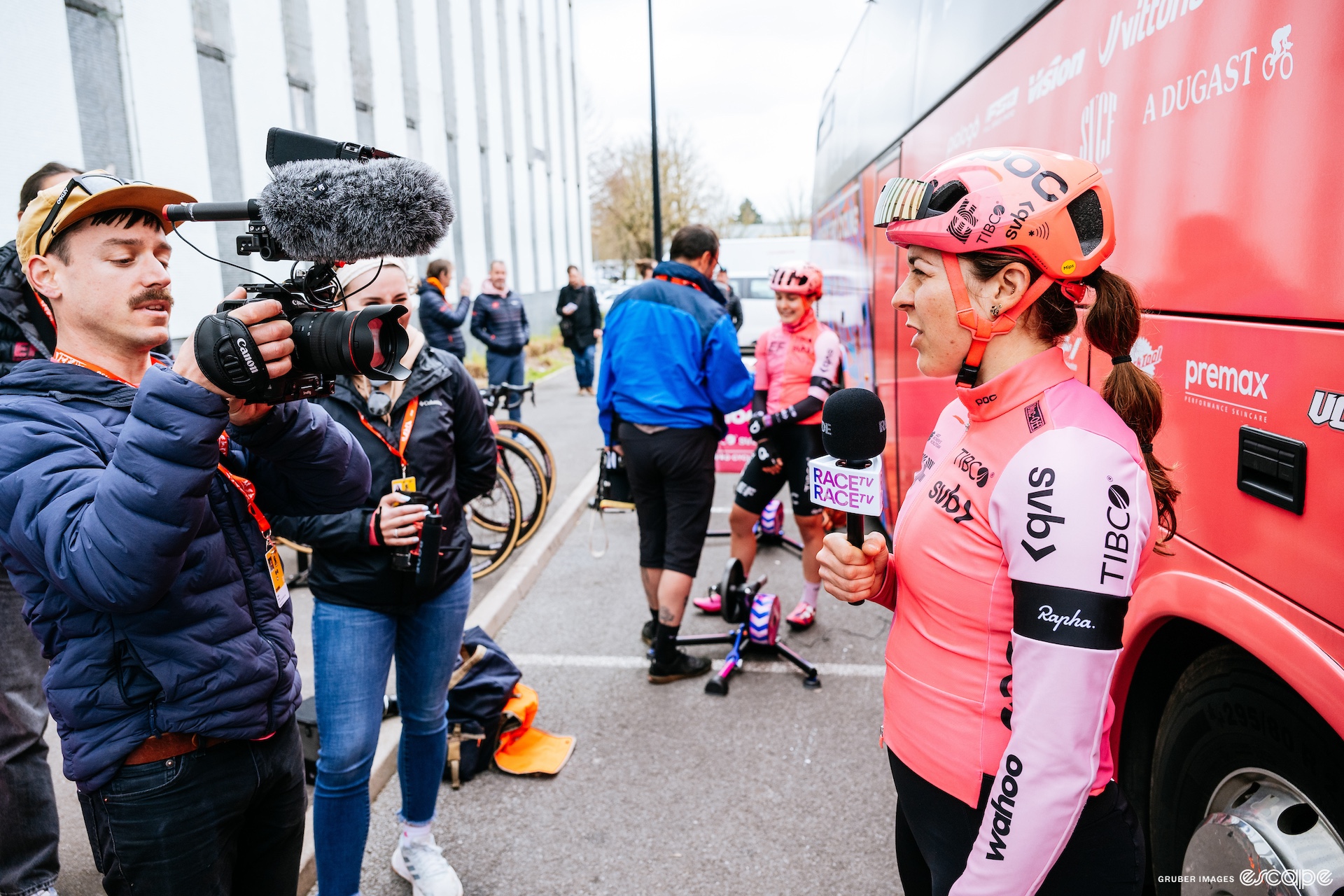
After the race, I made sure every one of my teammates and everyone on the staff held that rock. It’s rare to be the person who wins Paris-Roubaix, but it’s also rare to be on the team that wins. How often will you even get to see this iconic trophy? I wanted everyone to feel what it felt like. I wanted everyone to feel like they were part of it, to have a story to tell for the rest of their lives. Being a teammate of someone who accomplishes something so big is a feeling and story you can take with you and tell forever.
The chaos didn’t stop after getting the rock. It’s funny, actually, before the race there was this little girl and I gave her a cap. She’s a huge fan of Marianne Vos and I wanted her to think I was cool like Marianne Vos. The only way that I could actually do that was to win the race, and after I’d won I saw her standing with her mom on the other side of the barriers so I went over and had her hold the rock, a real full-circle moment.
During anti-doping, my family called. They were all together for Easter weekend so they all watched the race together. All my nieces and nephews, who now think I am that much cooler. Even if they didn’t understand, they knew it was a big moment. What felt like hours before, after the race, I had had this sad moment when I thought about how my family wasn’t there with me, wasn’t even on the same continent. That they didn’t get to share in the moment with me like Zoe’s parents standing at the finish line. But when they called and they had all been watching together, it was really beautiful.
I see them so much less because of this career choice that I’ve made. Even when I’m home at Christmas or when we have family time they have had to adapt to my training schedule for many years now, so for them to be part of that moment was special for me.
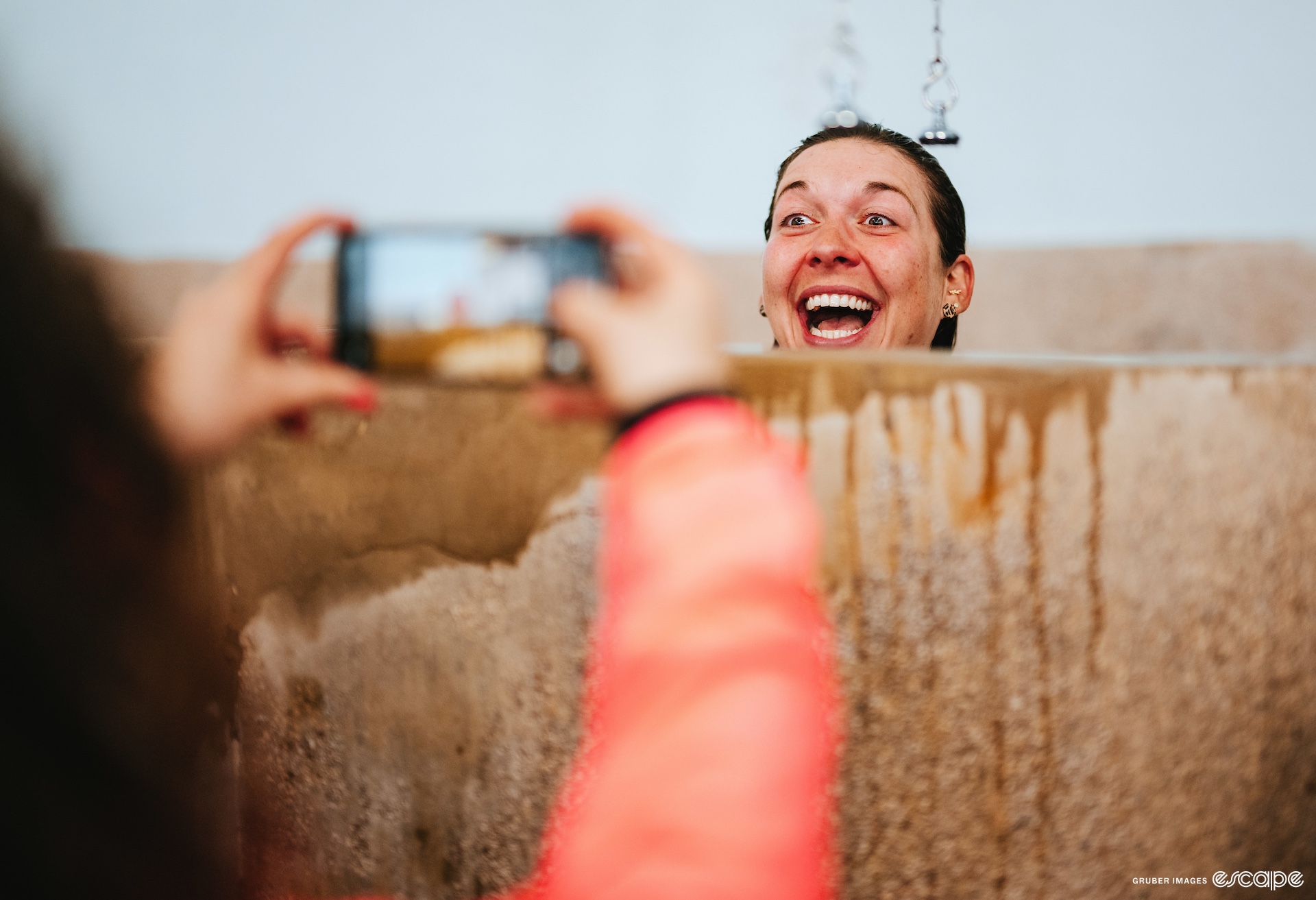
It wasn’t quiet until after the press conference, but even then there was still the odd person who had been waiting to get a photo with me.
Other years when you go to the showers it’s busy and you wait your turn, and the water pressure is a dribble because everyone is using it. It felt like a sanctuary of a place because it was quiet, it was just my people. They were all there for me.
There was a photo, taken by Ashley Gruber, of Meg, my soigneur, holding my rock for me while I was taking a shower. She had the best smile.
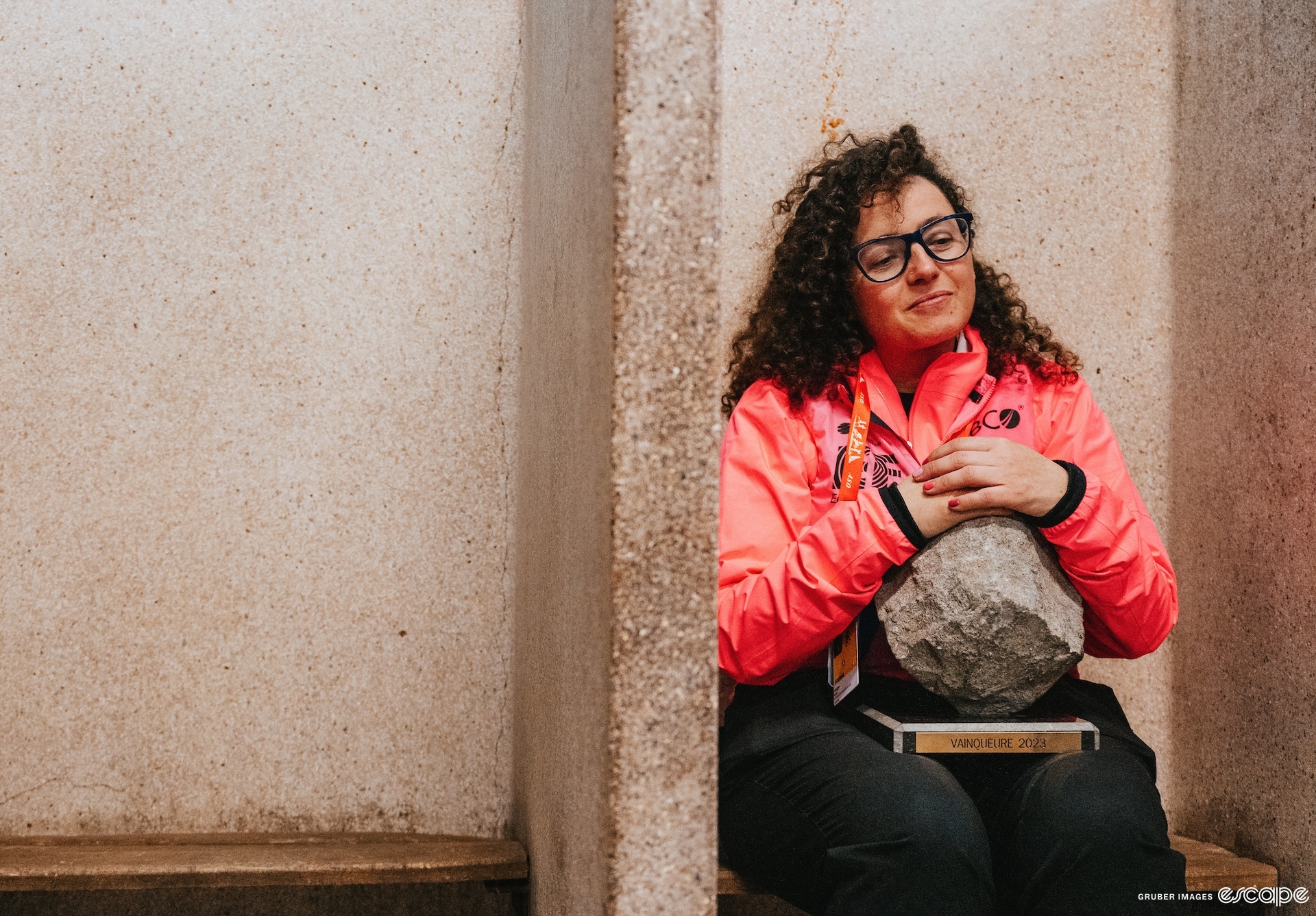
Then I finally got to come out and walk up to my team who had all been waiting for me. I finally got to share some quiet moments with my team who had made the dream come true. On the bus after the race everyone got to share their own stories from the race, and about how they were part of the win, how they learned about it.
Straight away one of my teammates went out and got champagne so we could celebrate together. Because it may have been me who got into the break and made the right decisions in the race, but my heart was so happy on that program because the people on the team were lovely people to work with. We have a lot of fun. That whole base environment allowed me to see the race the way I did, and to have the tenacity to do what I did on the day. That’s what it means to win as a team. I may not have gotten a leadout, but it was everything that happened before that that made the environment on the team what it is and that allowed me to do what I did on that day.
For the next three nights, I think I slept a total of four hours. Sometimes when you don’t do things right in a bike race you have a sleepless night thinking of all the things you could have done but I just couldn’t stop thinking “wow,” or replaying moments in my head.
Once I got back to Girona my friends there had a surprise party for me and we re-watched the race, so I got to watch them watch me, and in them, I could see all of their emotions for me. Feelings of hope that I would win and worry that I wouldn’t. When you see all those people who love you so much and always hope the best for you, when I won I could see that they felt like champions. This win had ripples. It meant so much to more people than just me.
Because I’ve celebrated this win, my belief in myself is so high. Confidence is settled deep into my bones. I also really understand that progression in cycling is never linear. My first few years in Europe I went from getting top 30s to top 20s and then maybe a top 10 or two. After that, I thought that the next year I would start winning, but it’s not like that. You can have a breakthrough race, but the next race you will have to work extra hard to try to win.
I took this as such a special gift at the moment. I will lose a lot more races before I win my next one. What I hope it does is inspire the whole team to think it’s possible. You need to risk losing to win; for me, it made my season a great season. In the future, I know I will ride boldly. Because I have this win I can take more chances and I can be more confident to put my hand up at a race like the Tour de France Femmes or the World Championships.
There are still plenty of races I want to win, Classics like the Tour of Flanders and Gent-Wevelgem, the World Championships, and an Olympic Gold medal. I still have so many dreams.
Did we do a good job with this story?
